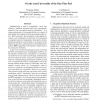Free Online Productivity Tools
i2Speak
i2Symbol
i2OCR
iTex2Img
iWeb2Print
iWeb2Shot
i2Type
iPdf2Split
iPdf2Merge
i2Bopomofo
i2Arabic
i2Style
i2Image
i2PDF
iLatex2Rtf
Sci2ools
112
click to vote
FOCS
2002
IEEE
2002
IEEE
On the (non)Universality of the One-Time Pad
Randomization is vital in cryptography: secret keys should be randomly generated and most cryptographic primitives (e.g., encryption) must be probabilistic. As a bstraction, it is assumed that there is a source of truly random bits available to all the participants of the system. While convenient, this assumption is often highly unrealistic, and cryptographic systems have to be built based on imperfect sources of randomness. Remarkably, this fundamental problem has received little or no attention so far, despite the fact that a related question of simulating probabilistic (BPP) algorithms with imperfect random sources has a long and rich history. In this work we initiate the quantitative study concerning feasibility of building secure cryptographic primitives using imperfect random sources. Specifically, we concentrate on symmetric-key encryption and message authentication, where the shared secret key comes from an imperfect random source instead of being assumed truly random. In eac...
Cryptographic | Cryptographic Primitives | FOCS 2002 | Imperfect Random Source | Theoretical Computer Science |
Related Content
| Added | 14 Jul 2010 |
| Updated | 14 Jul 2010 |
| Type | Conference |
| Year | 2002 |
| Where | FOCS |
| Authors | Yevgeniy Dodis, Joel Spencer |
Comments (0)

